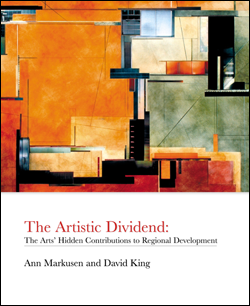Funding Research
2003, 15 pages. Americans for the Arts, 1000 Vermont Avenue NW, 6th floor, Washington, DC 20005, 202-371-2830, info@artsusa.org, www.americansforthearts.org
Read More...2002, 100 pages. The Marie Walsh Sharpe Art Foundation and the Judith Rothschild Foundation, 830 North Tejon St., Suite 120, Colorado Springs, CO 80903, (719) 635-3220, www.sharpeartfdn.org
Read More...2004, 38 pages. New York State Artist Workspace Consortium, kerry@mccarthyartsconsulting.com, www.nysawc.org
Read More...March 2004, 27 pages. Project on Regional and Industrial Economics, Humphrey Institute of Public Affairs, University of Minnesota, 301 19th Avenue, Room 231, Minneapolis, MN 55455, (612) 625-8092, amarkusen@hhh.umn.edu or gshrock@hhh.umn.edu or mcameron@hhh.umn.edu, www.hhh.umn.edu
Download:
Read More...2002, 127 pages. The Center for an Urban Future, New York, NY, 212-479-3344, www.nycfuture.org.
Read More...What can evaluation accomplish for grantmakers and grantees? What roles should each play in the design and execution of the evaluation process? Recent briefings from The Conservation Company and the Neighborhood Funders Group examine these questions from different vantage points.
Evaluation: The Good News for Funders
Andrew Mott
2003, 15 pages. The Urban Institute/Wallace Foundation, www.wallacefoundation.org or www.urban.org
Many grantmakers express a heightened interest in learning more about cultural participation. Research about who participates, what motivates people to participate and the barriers to participation provides valuable data to cultural organizations and funders seeking to broaden, deepen, and diversify audiences for these offerings.
Read More...November 2002, 36 pages. Center for an Urban Future, 212-479-3338, www.nycfuture.org
Read More...2002, 20 pages. Americans for the Arts, 203.371.2830, www.AmericansForTheArts.org
"When we hear talk about reducing support for the arts," writes Robert Lynch, president of Americans for the Arts, "we should ask: Who will make up for the lost economic activity?" The gist of the message of that group's Arts & Economic Prosperity report is simple and catchy: "the arts mean business."
Read More...
July 2003, 25 pages. Project on Regional and Industrial Economics, Humphrey Institute of Public Affairs, University of Minnesota, 301 S. 19th Avenue, room 231, Minneapolis, MN 55455, (612) 625-8092
Download:
![]() The Artistic Dividend (1.6Mb)
The Artistic Dividend (1.6Mb)
